- Home
- Neal Shusterman
Resurrection Bay Page 2
Resurrection Bay Read online
Page 2
—shining right into the face of the creature.
I yelped and leaped back against the wall of the house but held tight onto that flashlight, afraid to drop it again. Afraid of being left alone in the darkness with the thing.
Then I realized this wasn’t a thing at all. It was a person. A woman. Her clothes were tattered, her hair was matted, and her skin was so pale, it was almost white. But that wasn’t the worst of it. The worst was her eyes. They were a deep, deep blue. A shade of blue that somehow seemed even darker than black.
And she was wearing my charm bracelet.
I was so shocked, so freaked out, all I could say was, “That’s mine. . . .”
She slowly turned her head to look at her wrist, then took off the bracelet, dropping it in front of me.
“Wakeful,” she said.
“What?”
“Awake. Can’t sleep. Wakeful.” She tilted her head oddly, and her neck let out a sound like crackers crunching in your hand. “Don’t I know you?” she asked.
I shook my head, even though I knew I had seen her somewhere before. I was sure of it.
“Yes,” she said. “Yes, I do know you!”
Then one of those god-awful, enormous, should-be-dead-by-now spiders came webbing down from the crossbeam up above, landing right on her cheek . . .
. . . and the moment it touched her face, the spider frosted up and froze solid. It fell to the ground with a clink, like an eight-legged piece of glass.
I screamed and bolted as fast as I could, dropping the flashlight along the way. I stumbled in the darkness until finally I came out from underneath the porch. I raced up the porch steps, just as my dad, Mr. Carnegie, and Rav burst out of the house, having heard my scream.
“What is it, honey? What’s wrong?”
“You see an animal or something?” asked Rav.
I couldn’t catch my breath. “No, not an animal.” I let them help me inside. My head was spinning.
“I saw . . . I saw . . .”
I sat down—no—I collapsed in a kitchen chair.
“Anika, you’re bleeding!” My father grabbed a towel and touched it to my bloody forehead.
“What did you see, Anika?” Rav asked.
I grabbed the newspaper from the table and pointed to the picture on the front page. The newlydead couple. The smiling woman in the picture. “Her!” I told them. “I saw her.”
Stunned silence. No one knew what to say. Then a neighbor came bounding in.
“Did you hear? Did you hear?” he shouted, completely oblivious to what was going on around him. “The glacier’s changed direction!”
“Glaciers don’t change direction,” said Rav’s father.
“This one did. It’s not heading toward the center of town anymore. It’s just gonna catch the edge. Now they’re saying it’s just gonna take out Dunbar Street and everything west of it.”
“That’s . . . great,” said Rav’s dad, still a little bit rattled by what I had just told them. “There’s nothing west of Dunbar Street but old warehouses.”
I shook my head.
“You’re wrong,” I told Mr. Carnegie. “There’s something else west of Dunbar Street.”
“What?” asked Rav.
I swallowed, feeling that chill of the glacier slide down my throat, making my stomach seize into a knot. “The cemetery.”
On Thursday, at about two thirty in the morning, Exit Glacier, having plowed through the forest before it, gouged its way through the fence of Seward Memorial Cemetery. It took down headstone after headstone. It tore apart what few marble mausoleums stood there. They fell like houses of cards. The wall of ice churned up the hallowed ground, and then when the entire cemetery was under the massive sheet of ice . . . the glacier stopped.
Just as quickly and mysteriously as it had begun, the forward surge ended. Most people agreed that it was some kind of miracle. I wasn’t so sure.
In the morning, Rav and I ditched school. I think half our school ditched so they could join the crowds standing in front of what used to be the town graveyard, getting only as close as police would allow. Mostly, our friends and neighbors were hoping for a moment of TV fame; with all the reporters there, chances were good that some of them would be interviewed.
Rav and I didn’t crowd the barricade like the others because we were there for a different reason. Instead, we climbed to the top of an abandoned work shed, where we could have a better view of the whole face of the glacier, and we waited.
Rav was not happy about being here, but he wasn’t leaving, either.
“What you’re thinking is crazy,” Rav said.
“I know.”
“I should just walk away from you,” Rav said.
“Then why don’t you?”
“I guess I must be crazy, too.”
I smiled at him, and that seemed to make him a little bit ill. He looked away. “You said you banged your head, right?”
“I didn’t bang it that hard.”
“It was hard enough to make you bleed,” he pointed out. “You were in pain and probably confused. How can you be sure of what you saw that night?”
“Because I am.”
We watched as the geologists took measurements and the reporters reported. Not a single piece of ice had fallen from the glacier’s face since we’d arrived.
“I really don’t want to spend a whole day watching a glacier not move,” said Rav.
“I know what I saw the other night—it was that dead woman,” I insisted. “And maybe it’s not as impossible as you think. The Tlingit traditionally believe that everything is interconnected. The earth and the sky, the ice and us.”
“You’re only half Tlingit,” he pointed out.
“Right, so the other half is annoyingly skeptical and needs undeniable proof. That’s why we’re here.”
“What do you expect to see? Dead people strolling out of the ice like zombies, looking for brains to eat?”
I turned back to the glacier. “No, not zombies. Not exactly . . .”
“Then what?”
“I don’t know. There’s not a word for what they are.”
“And anyway,” said Rav, “most of the people in that cemetery have been dead since, like, forever. There won’t be any thing left to come back.”
“Permafrost,” I told him.
“What?”
“There’s permafrost six feet down. It’s frozen all year round, which means that a lot of people will be perfectly preserved.”
Rav got that ill look about him again, maybe even worse than before. He opened his mouth to say something, then closed it again when nothing came out.
We watched for a few more minutes in silence, then Rav asked me, “So, is your mom buried here?”
I shook my head. “No,” I told him. “Her family took her to a Tlingit burial site.”
“Oh.” He was quiet for a good ten seconds before he said, “Mine is.”
Nothing out of the ordinary happened at the glacier that day, or the next, so things began to settle back to normal. Many of the geologists and all the reporters left—the glacier was now old news. It sat there more still than ever, its leading edge hunched on the cemetery.
It’s funny how the rational world has a way of pummeling things that don’t make sense into a neat little pile that it can push under a rug and dismiss. That whole business with the woman under the porch, for instance. See, the next day some homeless woman was found shoplifting in town. She was one of the summer people who didn’t leave, because she apparently had nowhere to go. Even though this woman had blond hair and the woman I saw didn’t, it put enough doubt into my mind. Maybe that’s who I saw. After all, it was just in the dim light of a dying flashlight, and as Rav was so happy to point out, I had bumped my head. My thoughts might have been addled. That made more sense than anything else, and with things getting back to normal, I’d rather believe I was temporarily nuts than the alternative.
But there were things going on in the town in those fe
w days after the glacier had made its move. Had I been more observant, I might have noticed. I might have put two and two together.
Like the way our English teacher, Mrs. Mason, suddenly seemed to have no interest in teaching at all. And when the bell rang, she left class even faster than us kids.
Like the way that our mailman stopped delivering mail. He just stopped showing up. Word was that he didn’t call in sick or anything—he just locked himself in his house and wouldn’t come out.
Or the way Betsy down at the nail salon kept redoing her own nails, happy as a clam, instead of doing her customers’ nails.
But the only thing I noticed was the strange way Rav was acting, especially toward me. He was avoiding me; he wouldn’t even look at me in class. When I finally did corner him by his locker, he yelled at me.
“Just go away. I don’t want to talk to you, okay?” And he stormed off.
He failed a math test that day, and I figured that maybe he was mad because I’d made him sit on that stupid roof watching for the undead instead of letting him study. Rational. Simple. Easily explained away.
A week later, Dad went out on a date. Believe it or not, one of the female geologists he had been flying around had taken a liking to him. She was one of the few still in town to take readings, but I suspect that was just because she wanted to see more of Dad. I wasn’t sure how I felt about it, but I wasn’t going to ruin it for him.
It was a bright full moon that night, and Dad was going to take her on a moonlit flight over the ice field. Very romantic. I, of course, was left at home to babysit Sammy, but at around eight o’clock, Rav turned up on our doorstep, knocking so timidly I was actually surprised it was him.
He stood there with his shoulders shrugged up awkwardly, like he was cold, even though he was wearing a heavy jacket. There was something on his mind. Something that was weighing on him so heavily, I could practically see his back curving from the burden of it.
“I just want to say I’m sorry,” he said. “I shouldn’t have acted the way I did to you.”
Since Rav rarely apologized for anything, I decided to milk it. I folded my arms and leaned against the door frame. “No, you shouldn’t have,” I said, pretending I wasn’t ready to accept his apology, even though I was.
“Yeah, and I’m sorry.”
That weight still lingered on him. As much as I wanted to make him suffer, I couldn’t. “Apology accepted. So what’s wrong?”
“Nothing,” he said a little too quickly. “Nothing’s wrong at all. As a matter of fact, things are totally right.” He gave a weird little laugh; then he said, “There’s something I want to show you. I know it’s late, but do you think you can get out?”
“Sure,” I told him. “My dad’s not home anyway.”
Then Sammy, who had snuck up right behind me, asked, “Can I come, too?”
The look on Rav’s face said that Sammy wasn’t invited. I figured this might be about his apology and about us making up. The last thing I needed was Sammy along as a third wheel.
“No,” I told Sammy. His face got all twisted, and his body all limp boned. “Anika . . . ,” he whined.
I looked to Rav, but he shook his head. So I made a decision. “Sure,” I told Sammy. “. . . Of course, if you come, you’ll miss Dad flying by.”
“What?”
“Yeah, Dad’s gonna do a low flyby and wave to us—maybe even set down and pick us up to take us with him to the ice field.”
“Really? D’ya think he’d land right on the roof?”
“Maybe,” I said. “You know how Dad likes to surprise us.”
Then I waited for a moment before I shook my head and said, “Naah, forget it. He’ll have to do it another time. You have to come with Rav and me.”
“Why?” he said, getting all twisty and limp boned again.
“You’re too little to stay here by yourself.”
He looked at me, deeply insulted. “Am not!”
And that’s all it took.
Sammy promised to be good and not to watch anything scary on TV. I left holding hands with Rav, wondering what he had to show me, hoping it was something fun . . . and never even imagining the truth behind it.
There’s a before, and there’s an after. There are those events that surgically slice your life in two; and once it happens, you know that you’re on the other side of that painful incision, and there’s no going back to the way things were before. If you’re lucky, the wound heals into a jagged scar. And if you’re unlucky, it never heals at all; it just keeps bleeding. The knife came down for me on that bright, moon-pale night.
As Rav and I walked down the street, he said to me, “You know, I couldn’t stop thinking about what you said the other day. About that woman under the porch.”
I shrugged. “I was just being stupid. It wasn’t who I thought.”
“I think maybe it was,” Rav said.
That got me a little angry. Had I been so convincing that I had him believing it, too, or was he just making fun of me? Either way, I had spent so much brain power trying to make the whole episode go away, I didn’t want to bring it back up again.
Instead of heading to his house, we turned left at the end of my street and walked toward Main Street.
“Where are we going?” I asked.
“You’ll see.”
He took me to his father’s pub, which was closed. That was odd, because it was a favorite local hangout—especially this time of year when most of the other bars were closed for the winter. Even worse, the windows were frosted in that white, soapy stuff they use to mask the glass when a place goes out of business.
“My dad’s up north,” Rav said.
“You mean Anchorage?”
“No, I mean north, north. But he’ll be back soon.”
Now, in most other places when you say someone’s “up north,” it doesn’t mean very much; but when you live in Seward, Alaska, all you’ve got up north are places so cold you don’t want to go there. They call winter “The Hammer” because when it comes down, it hits hard, and all you can do is hunker down until the thaw. So the thought of his dad going north for any reason didn’t sit well with me.
“What’s he doing?” I asked. “Hunting?”
“Yeah,” said Rav. Then he thought about it. “Kind of,” he said. Then finally, “No, not really.”
“So where is he?”
“Prudhoe Bay,” he told me. I got a shiver just thinking of it. Prudhoe Bay is so cold it makes Resurrection Bay look like the Bahamas. It’s where the Trans-Alaska pipeline starts, way on Alaska’s northern shore, up above the Arctic Circle. One of the coldest places on Earth.
“You guys aren’t thinking of leaving here, are you?”
“No,” said Rav, then he thought about it. “I don’t know,” he said. Then finally, “Yeah, maybe.”
But before I could even consider the idea of life around here without Rav, he took out his keys and unlocked the pub.
He opened the door a crack, then slowly peeked in. It was dark in there. Only faint, diffused moonlight spilled through the clouded windows. I could hear music playing somewhere as we stepped in.
Rav closed the door behind us but didn’t make a move to turn on a light yet. It was guitar music playing, an acoustic guitar by the sound of it—a gentle, mournful plucking.
“Don’t be scared,” Rav said. “It’s important that you’re not scared.”
Then I began to get an awful feeling in my gut. The kind you get when the phone rings at two in the morning and you know in your heart of hearts, even before you pick it up, that it’s really, really bad news.
I reached for the light switch, but Rav firmly grabbed my wrist before I could.
“You know all that stuff you were saying? About how the glacier dug its way through the cemetery on purpose, like it knew what it was doing?”
“I never said that!”
“But I know it’s what you were thinking, wasn’t it?” And then he said, in a terrible whisper, “Well, yo
u were right.”
He reached over and turned on the light.
There, in one of the farthest booths, sat a woman playing the guitar, but most of her face was still in shadows. Rav, still holding my wrist, pulled me toward the woman. Something was telling me I didn’t want to see this—that I didn’t want to be there at all. But my curiosity was more powerful than my instinct to run.
Her hair was dangling in front of her face and over the guitar strings as she played. The guitar was covered with frost; icy condensation spilled from its open hole like when you open a freezer door. Only then did I realize the entire room was very, very cold.
Rav said, “I brought someone to see you, Mom.”
She turned to me, her head moving in that same jarring, gritty way that the woman under the porch had moved. I instantly recoiled, backing right into Rav’s chest, but he stood there like a boulder, not letting me get away.
“It’s okay,” Rav said. I don’t know whether he was talking to me or to this . . . this thing in front of me.
“Don’t let this frighten you,” Rav said, but how could I not be frightened? I had gone to this woman’s funeral. She had been dead for two years. Even now her face bore the signs of death. Her lips were a little too thin, her eyes were set too deep in her face, her cheeks were too sunken.
Rav must have known what I was thinking because he whispered, “It was worse when she first came back, but each day she’s looking a little bit better. She’s not as confused as she was, either. Every day she remembers more and more. She’s becoming like she used to be.”
The dead woman held me in her gaze, her eyes a deep blue like the depths of a glacier crevasse. Then she forced her lips to form a smile. “Anika!” Her voice was both gentle and gruff. Inhuman. “How are you?”
Every ounce of me wanted to scream, but my throat felt frozen shut. I could only stare.
“Answer her,” Rav prodded. “Don’t be rude! She won’t like it if you’re rude.”
I cleared my throat and swallowed. “I . . . I’m fine. . . .”
“Look how you’ve grown. Just like my Rav,” said the woman who had once been Mrs. Carnegie. “Come closer, Anika.”
Afraid to disobey, I swallowed my terror and took a step closer.

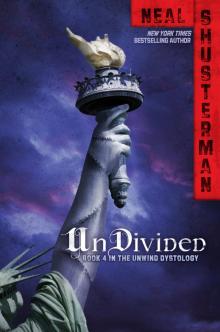 UnDivided
UnDivided UnBound
UnBound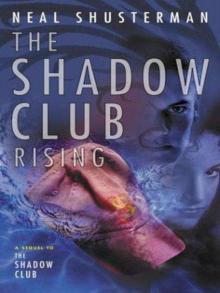 The Shadow Club Rising
The Shadow Club Rising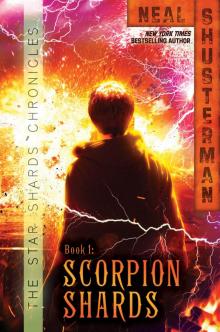 Scorpion Shards
Scorpion Shards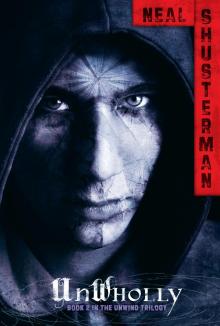 UnWholly
UnWholly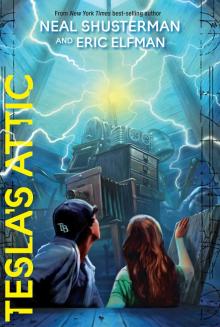 Tesla's Attic
Tesla's Attic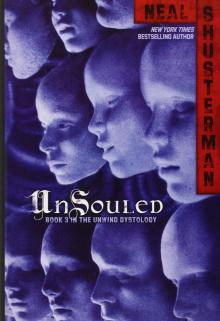 UnSouled
UnSouled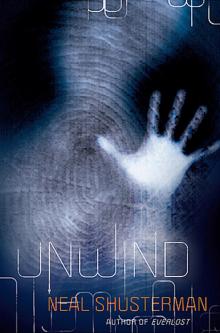 Unwind
Unwind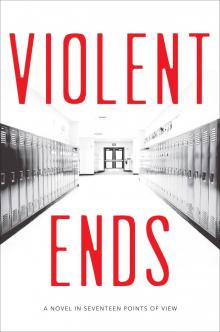 Violent Ends
Violent Ends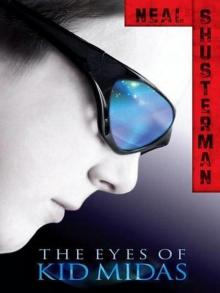 The Eyes of Kid Midas
The Eyes of Kid Midas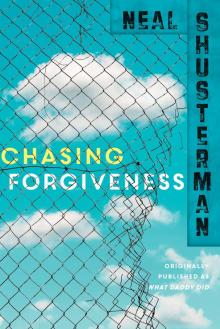 Chasing Forgiveness
Chasing Forgiveness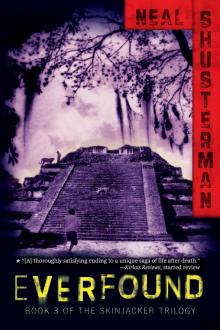 Everfound
Everfound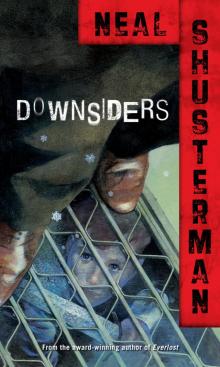 Downsiders
Downsiders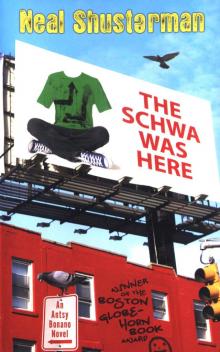 The Schwa Was Here
The Schwa Was Here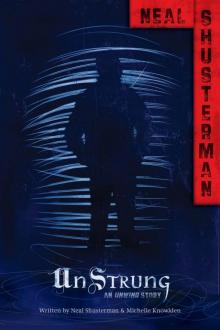 UnStrung
UnStrung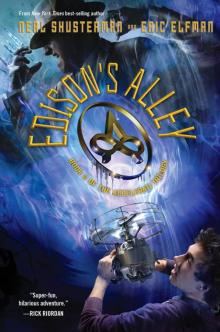 Edison's Alley
Edison's Alley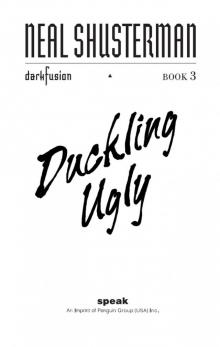 Duckling Ugly
Duckling Ugly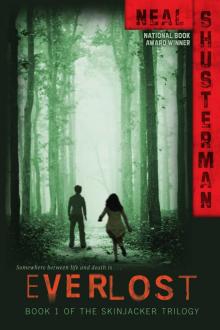 Everlost
Everlost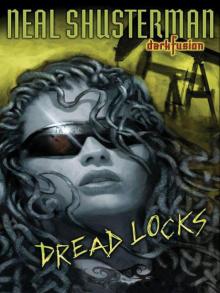 Dread Locks
Dread Locks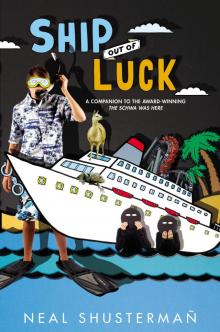 Antsy Floats
Antsy Floats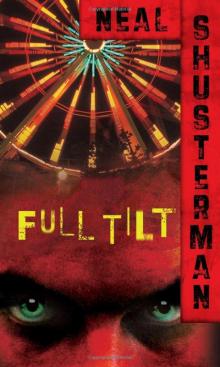 Full Tilt
Full Tilt Thunderhead
Thunderhead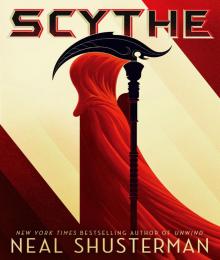 Scythe
Scythe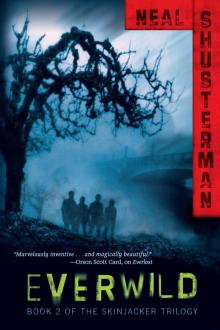 Everwild
Everwild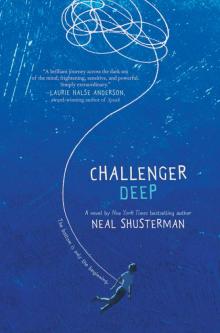 Challenger Deep
Challenger Deep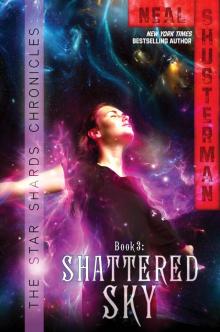 Shattered Sky
Shattered Sky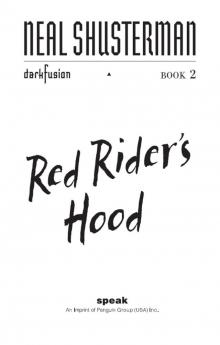 Red Rider's Hood
Red Rider's Hood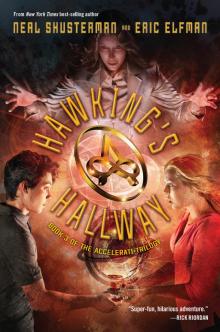 Hawking's Hallway
Hawking's Hallway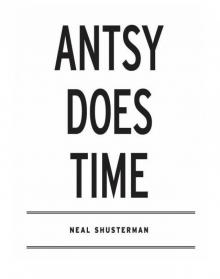 Antsy Does Time
Antsy Does Time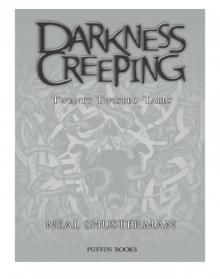 Darkness Creeping: Twenty Twisted Tales
Darkness Creeping: Twenty Twisted Tales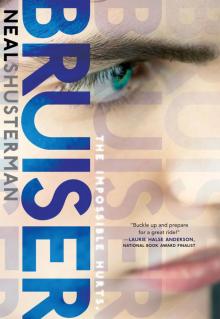 Bruiser
Bruiser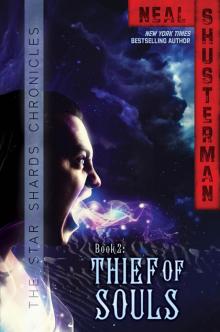 Thief of Souls
Thief of Souls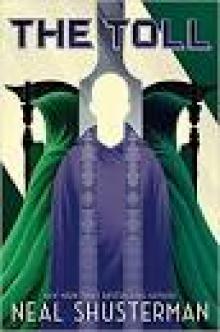 The Toll
The Toll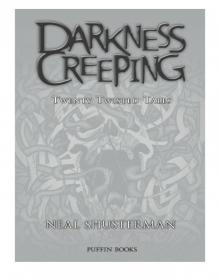 Darkness Creeping
Darkness Creeping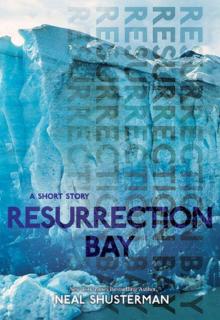 Resurrection Bay
Resurrection Bay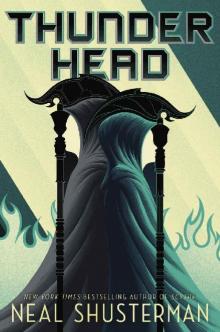 Thunderhead (Arc of a Scythe Book 2)
Thunderhead (Arc of a Scythe Book 2)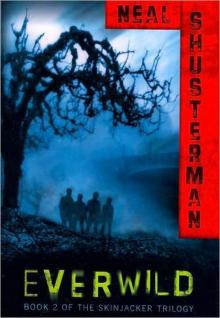 Everwild (The Skinjacker Trilogy)
Everwild (The Skinjacker Trilogy)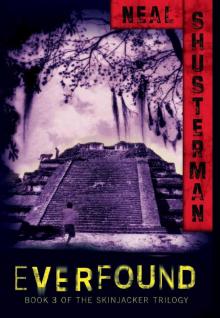 Everfound s-3
Everfound s-3 Edison’s Alley
Edison’s Alley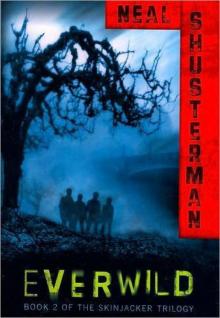 Everwild s-2
Everwild s-2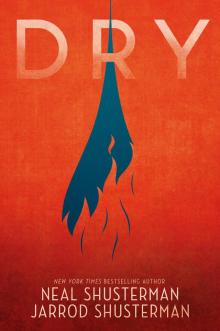 Dry
Dry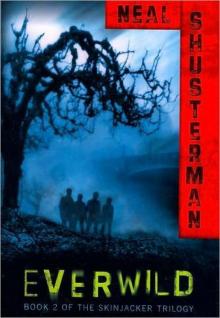 Skinjacker 02 Everwild
Skinjacker 02 Everwild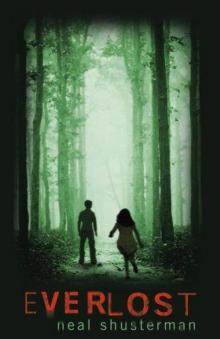 Everlost s-1
Everlost s-1